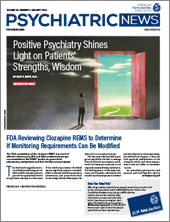Many children and adolescents with bipolar disorder or related mood problems who take antipsychotics to treat manic and/or depressive symptoms experience significant weight gain and other metabolic side effects. The diabetes medication metformin can help mitigate some weight gain in these youth, according to data presented at the American Academy of Child and Adolescent Psychiatry Annual Meeting last October.
“Middle school and high school are hard enough for body image,” said Christina Klein, Ph.D., a research scientist at the University of Cincinnati (UC) College of Medicine and one of the investigators on this clinical trial. The onset of rapid weight gain only exacerbates feelings of unhappiness or embarrassment, and it can lead many youth to forego taking their medication, she said. “Our goal should be to treat the whole person, and not just their bipolar symptoms.”
In 2015, the Patient-Centered Outcomes Research Institute (PCORI) funded a trial to compare weight and metabolic outcomes in youth taking antipsychotics who took metformin and participated in a program encouraging healthy eating and physical activity with those participating in a program encouraging healthy eating and physical activity only. Metformin is a well-tolerated drug that is known to have some weight-loss benefits in addition to managing blood sugar levels. The metformin dose started at 500 mg daily and was titrated up to 1500 mg or 2000 mg (depending on the participants’ weight) over eight weeks.
The trial, called MOBILITY, was led by Klein’s colleague Melissa DelBello, M.D., the Dr. Stanley and Mickey Kaplan Endowed Chair & Professor of Psychiatry at UC College of Medicine.
PCORI requires projects it funds to enroll participants that reflect the broader population. For the MOBILITY trial, the researchers recruited 1,565 youth aged 8 to 19 years from 64 clinical locations over a period of seven years. The locations included community-based mental health centers and academic health centers located in California, Kentucky, Maryland, Massachusetts, Minnesota, New Jersey, New York, Ohio, Pennsylvania, and Texas. Youth who had been diagnosed with bipolar spectrum disorders, disruptive mood dysregulation disorder, or mood disorder not otherwise specified and were taking a second-generation antipsychotic were enrolled in the trial.
Enrolling this number of youth was “a Herculean task,” said MOBILITY co-investigator Victor Fornari, M.D., a professor of psychiatry and pediatrics at the Donald and Barbara Zucker School of Medicine at Hofstra/Northwell in Hempstead, N.Y. “And then on top of everything, the pandemic happened.”
The primary outcome of the MOBILITY study, as presented at the meeting, was weight and metabolic changes in the participants after six months of intervention. However, the youth were followed for up to two years to assess long-term metabolic impacts.
At baseline, the average body mass index (BMI) of the participants was 29.2, with 68% of participants categorized as obese and 32% as overweight. One-third of the participants who had complete laboratory results available met the criteria for metabolic syndrome (the presence of at least three of the following risk factors: obesity, high blood pressure, elevated blood sugar, elevated triglycerides, and low HDL cholesterol).
Over 60% of the youth reported that they were unhappy or extremely unhappy about their weight at baseline, and over 50% reported being continually reminded or teased about their weight.
After six months, changes in BMI were modest, explained Jeffrey Welge, Ph.D., a professor of psychiatry at UC College of Medicine and lead statistician for the trial. He noted that average BMI-Z scores (a measure of patients’ BMI relative to the average of their age and sex, with 0 being the 50th percentile) of the youth who took metformin dropped from 1.90 to 1.81, whereas BMI-Z scores remained constant in the group who participated in the lifestyle program. Welge explained that this equates to metformin being associated with an average of 3 pounds lost or not gained.
Overall, around 51% of youth taking metformin were found to have lower BMI after six months, compared with 38% of those in the lifestyle group. Welge said this corresponds to a number needed to treat of 7 (for every 7 youth who add metformin to a lifestyle intervention, 1 will lose weight).
There were no significant differences in metabolic parameters between the two groups, with the exception of a 2.5 mg/dL increase in HDL cholesterol levels in the metformin group.
Youth taking metformin reported greater improvements in body satisfaction and hunger control than youth in the lifestyle-only group.
Welge noted that metformin was well tolerated, and most side effects were known gastrointestinal issues of this medication, such as nausea, diarrhea, and stomach cramps. He added that only about half of the participants reached the target metformin threshold of 1500 mg daily, which may have contributed to the modest weight loss findings.
DelBello added that the long-term data collection of the trial had wrapped up shortly before the AACAP meeting. A preliminary look at the data suggested that youth taking metformin were not at greater risk of long-term health concerns, such as abnormal vitamin B12 levels, which has been observed in some elderly people taking metformin.
Metformin is “not a magic pill,” Fornari told the audience. “But for many youth taking antipsychotics, this medication can mitigate their weight gain, and it comes with low risk.”
DelBello said that metformin could even be considered as a preventive measure. “I see no reason why you couldn’t start a patient on an antipsychotic and metformin together if someone expresses concerns about weight gain or is at the upper range of normal weight,” she said.
Additional studies are needed to determine if prescribing metformin to youth earlier on in the course of taking antipsychotics might lead to greater benefits and if youth taking antipsychotics for other conditions may also benefit from the medication. ■

